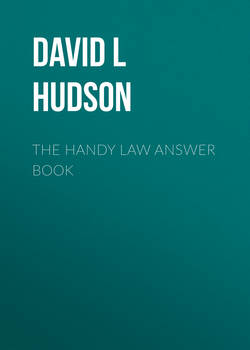Читать книгу The Handy Law Answer Book - David L Hudson - Страница 117
На сайте Литреса книга снята с продажи.
Must government officials always obtain a warrant before conducting a search or a seizure?
ОглавлениеNo, there are several exceptions to the warrant requirement. Some of these include: searches of public school students, exigent circumstances, hot pursuit, plain view, plain feel, consent searches (where an individual has given consent to a government official to search), search incident to arrest, automobile exception, border-search exception, open fields, and stop and frisk.
LegalSpeak: Redding v. Sanford Unified School District (2009)
Justice David Souter (majority): “Savana’s subjective expectation of privacy against such a search is inherent in her account of it as embarrassing, frightening, and humiliating. The reasonableness of her expectation (required by the Fourth Amendment standard) is indicated by the consistent experiences of other young people similarly searched, whose adolescent vulnerability intensifies the patent intrusiveness of the exposure…. In sum, what was missing from the suspected facts that pointed to Savana was any indication of danger to the students from the power of the drugs or their quantity, and any reason to suppose that Savana was carrying pills in her underwear. We think that the combination of these deficiencies was fatal to finding the search reasonable.”
Justice John Paul Stevens (concurring in part, dissenting in part): “I disagree with its decision to extend qualified immunity to the school official who authorized this unconstitutional search.”
Justice Ruth Bader Ginsburg (concurring in part, dissenting in part): “The Court’s opinion in T.L.O. plainly stated the controlling Fourth Amendment law: A search ordered by a school official, even if ‘justified at its inception,’ crosses the constitutional boundary if it becomes ‘excessively intrusive in light of the age and sex of the student and the nature of the infraction.’”
Justice Clarence Thomas (concurring in part, dissenting in part): “Unlike the majority, however, I would hold that the search of Savana Redding did not violate the Fourth Amendment. The majority imposes a vague and amorphous standard on school administrators. It also grants judges sweeping authority to second-guess the measures that these officials take to maintain discipline in their schools and ensure the health and safety of the students in their charge. This deep intrusion into the administration of public schools exemplifies why the Court should return to the common-law doctrine of in loco parentis under which ‘the judiciary was reluctant to interfere in the routine business of school administration, allowing schools and teachers to set and enforce rules and to maintain order.’”
